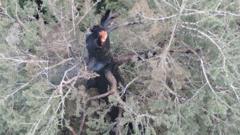ALBUQUERQUE, N.M. — The Trump administration is gearing up to hold formal meetings with Native American tribes in the southwestern United States as it considers undoing a 20-year freeze on oil and gas development covering expansive federal lands surrounding the Chaco Culture National Historical Park.
In a letter directed to tribal leaders, the Bureau of Land Management announced its intent to conduct an environmental assessment of the region, gearing up for possible future leasing of its federal parcels. A public commentary period is anticipated to follow these discussions.
As a UNESCO World Heritage site, Chaco has been embroiled in heated debates surrounding drilling activities for years, with the issue transcending multiple presidential administrations. At the heart of this cultural conflict is the park's historical significance, showcasing the remnants of ancient stone structures constructed by Indigenous peoples and traversed by ancient pathways.
In response to calls from some Pueblo leaders, the Biden administration established a temporary two-decade embargo on new oil and gas projects within a 10-mile radius of the park in 2023. This development has triggered concerns among tribal leaders and members of New Mexico’s Democratic congressional delegation, fearing that the current discourse might lead to the rollback of protections instituted under Biden.
Tribal leaders argued at an event in D.C. that the integrity of Chaco Canyon is pivotal to their identity and heritage. They underscored the need for maintenance of protections to honor the ancestral stewardship expertises of their predecessors.
In particular, Pueblo leaders communicated the intention to safeguard this culturally rich area, linking it intrinsically to their historical narratives and cultural legacies, while also positioning this discussion at the intersection of economic viability as new pressures mount. The ongoing discourse raises critical questions about the future of the land, as varying tribes have different opinions on the prosperity rooted in natural resources.
The debate has encompassed diverse tribal perspectives, particularly expressed by the Navajo Nation, which has positioned itself in favor of a more economically favorable approach to land usage, advocating for a narrowed protective scope. The ongoing litigation initiated by the Navajo Nation raises further complexities to the broader conversations surrounding cultural heritage and land development priorities.













